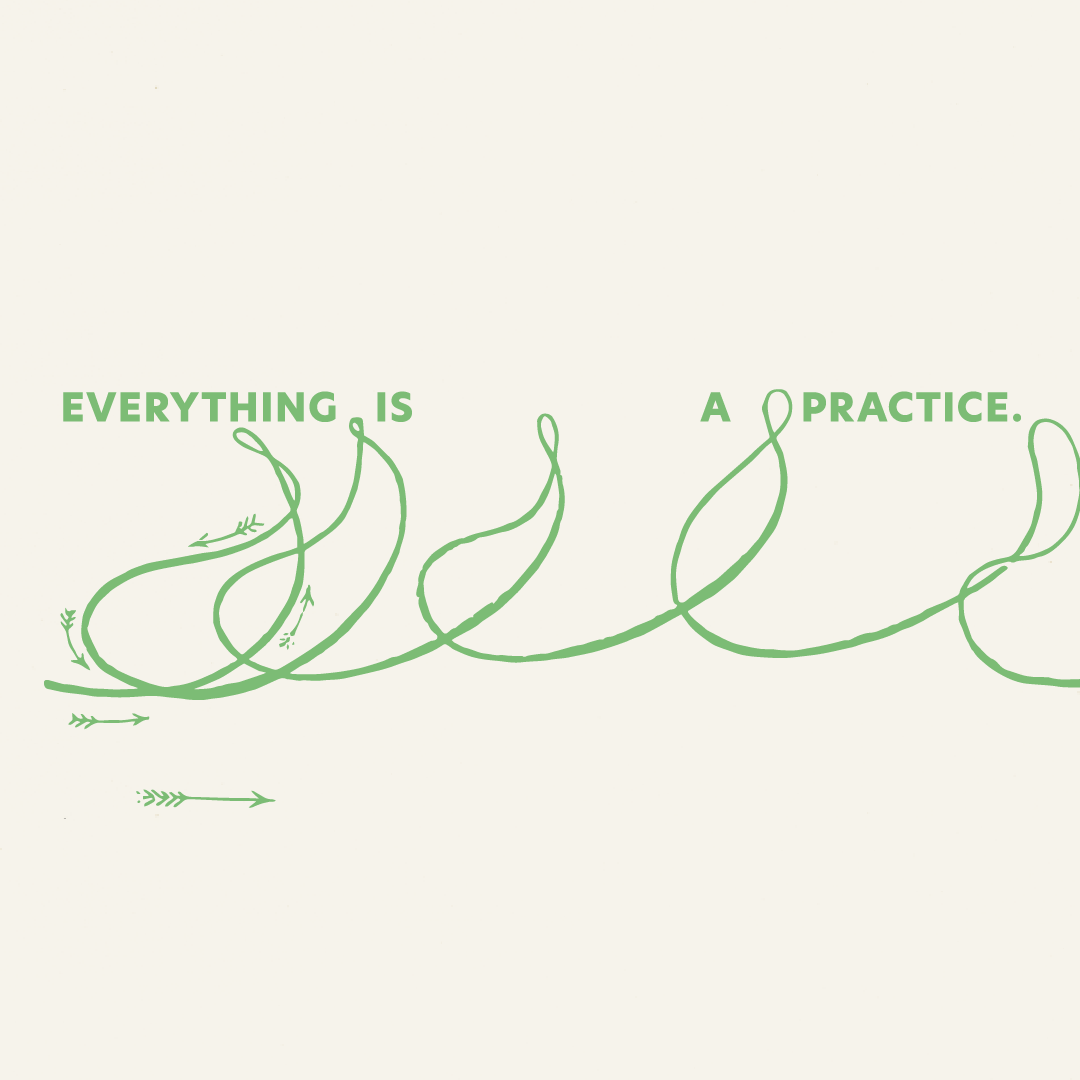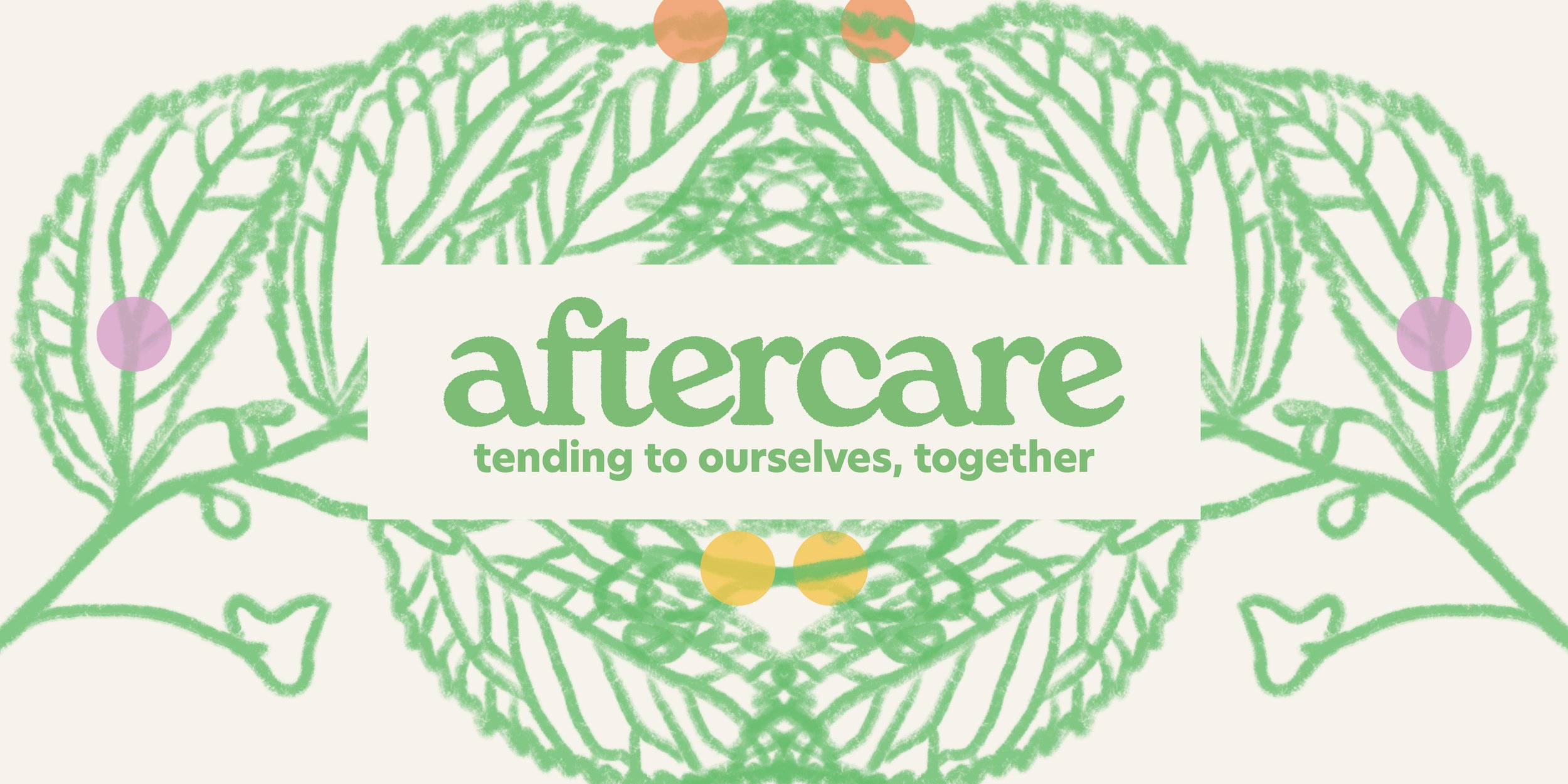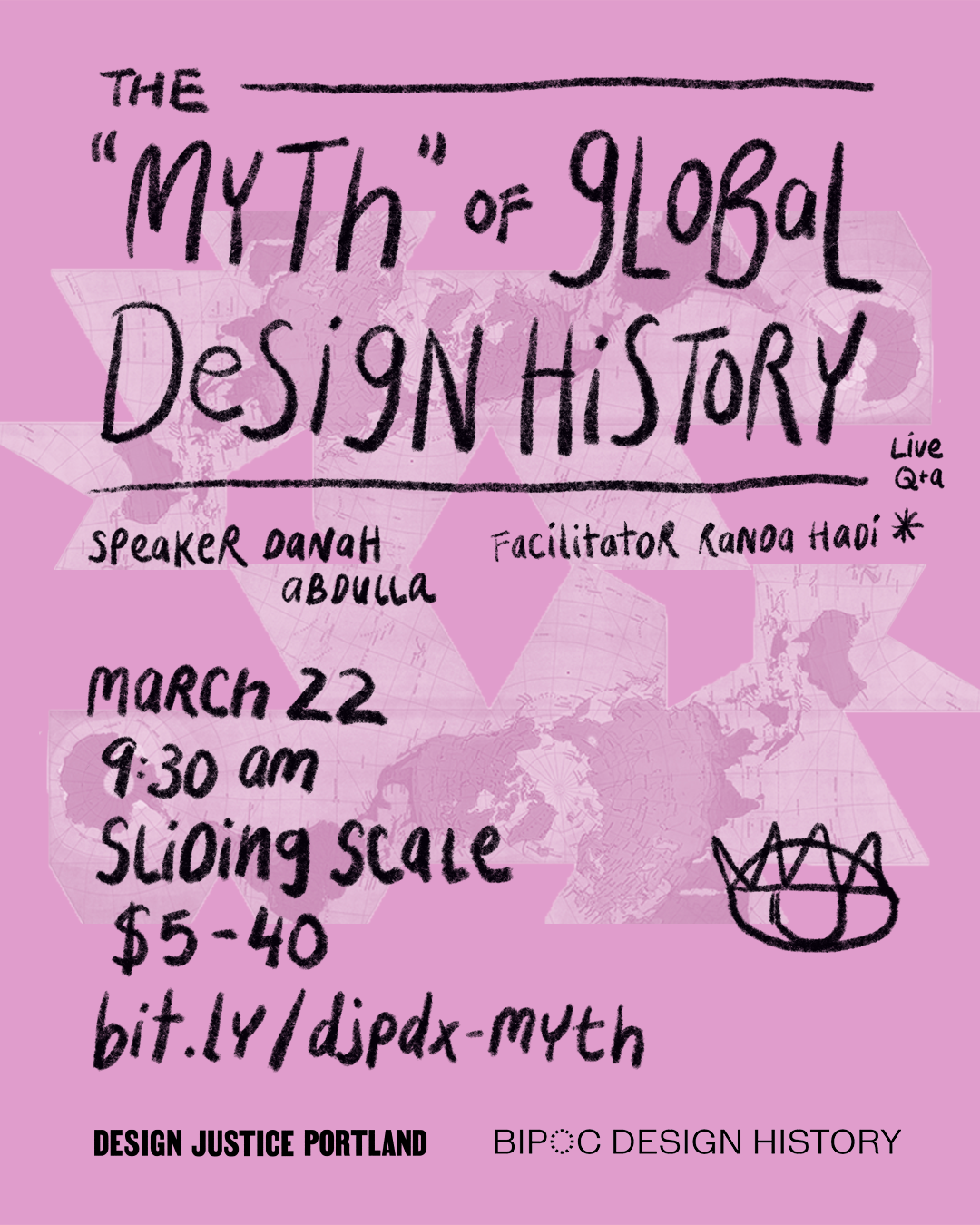
Monthly Meetup
Design Justice Portland
Monthly Meetup
Every second Thursday
This casual meetup is a chance to meet other people who use design-y skills to move our communities toward justice. Come as you are — all are welcome.
Workers Tap
A worker-owned and operated beer bar & cafe
101 SE 12th Ave
Portland, OR 97214
4 – 8 pm
We’ll start to gather in the basement and move to the main floor by around 6:30 pm. When the weather is nice, we will gather on the patio.
Access Information
Please bring a mask* and refrain from coming if you feel sick or have been exposed to people who are ill.
*Workers Tap is a public place; we can’t control whether patrons will wear masks in shared spaces. Masking is mandatory in the basement unless we have a consensus not to. A collective decision will be made each time we meet outdoors. We’ll try to provide masks whenever we can, or bring an extra to share!
Workers Tap’s building is generally wheelchair accessible with ramps, and accessible restrooms. While most spaces allow for maneuverability, the basement has limitations. For any specific accessibility accommodations, please email hello@designjusticepdx.com.

Monthly Meetup
Design Justice Portland
Monthly Meetup
Every second Thursday
This casual meetup is a chance to meet other people who use design-y skills to move our communities toward justice. Come as you are — all are welcome.
Workers Tap
A worker-owned and operated beer bar & cafe
101 SE 12th Ave
Portland, OR 97214
4 – 8 pm
We’ll start to gather in the basement and move to the main floor by around 6:30 pm. When the weather is nice, we will gather on the patio.
Access Information
Please bring a mask* and refrain from coming if you feel sick or have been exposed to people who are ill.
*Workers Tap is a public place; we can’t control whether patrons will wear masks in shared spaces. Masking is mandatory in the basement unless we have a consensus not to. A collective decision will be made each time we meet outdoors. We’ll try to provide masks whenever we can, or bring an extra to share!
Workers Tap’s building is generally wheelchair accessible with ramps, and accessible restrooms. While most spaces allow for maneuverability, the basement has limitations. For any specific accessibility accommodations, please email hello@designjusticepdx.com.

CANCELLED: Monthly Meetup
Cancelled due to weather
Design Justice Portland
Monthly Meetup
Every second Thursday
This casual meetup is a chance to meet other people who use design-y skills to move our communities toward justice. Come as you are — all are welcome.
Workers Tap
A worker-owned and operated beer bar & cafe
101 SE 12th Ave
Portland, OR 97214
4 – 8 pm
We’ll start to gather in the basement and move to the main floor by around 6:30 pm. When the weather is nice, we will gather on the patio.
Access Information
Please bring a mask* and refrain from coming if you feel sick or have been exposed to people who are ill.
*Workers Tap is a public place; we can’t control whether patrons will wear masks in shared spaces. Masking is mandatory in the basement unless we have a consensus not to. A collective decision will be made each time we meet outdoors. We’ll try to provide masks whenever we can, or bring an extra to share!
Workers Tap’s building is generally wheelchair accessible with ramps, and accessible restrooms. While most spaces allow for maneuverability, the basement has limitations. For any specific accessibility accommodations, please email hello@designjusticepdx.com.

The I in Us: Love in Practice & Play
A day of practice on loving ourselves and each other, through reflection and play, as a liberatory act in times of uncertainty.

October Online Meetup
An online space to connect with other practitioners and anyone curious about design justice.
All are welcome! No matter your experience level or background, you are encouraged to join.
This event will be facilitated by co-organizer Gaby Tirta.

The People's Digital Safety Fair
A COMMUNITY EVENT FOR US, BY US
The People’s Digital Safety Fair is a free community resource event dedicated to building our collective knowledge to protect our safety and well-being in an increasingly digital world.

September Meetup: Produce Row Patio
Come as you are and meet other folks practicing or curious about design justice.
Where: Produce Row Patio
204 SE Oak St
No RSVP is needed, come by and say hi.
Children and leased dogs are welcome! Produce Row is ADA-accessible. A 22% service fee will be added to the bill for Produce Row staff.
The patio is open-air but covered. Masks are encouraged and provided. If you feel sick, please do not come to help protect our community.
Want to meet online instead? Tell us when!
Questions or need specific accommodations? Email hello@designjusticepdx.com.

July Meetup
Come as you are and meet other folks practicing or curious about design justice.
We'll have dedicated time to get to know each other, share a bit about our practice, and chat about the local group.
Where: Alder Commons - Backyard
4212 NE Prescott St, Portland, OR 97218
If it's too hot, we’ll move to the playroom (masks are required inside).
Bring drinks and snacks, if you want! There’s Loncheria Los Mayas and Tiny Moreso Café and Treat Shop nearby.
Space Details: Alder Commons is next to the NE Prescott stop of Trimet Bus 75. There is a parking lot with 1 ADA parking space, and 2 ADA restrooms, and all indoor rooms are wheelchair accessible.
Health & Safety: Alder Commons' COVID safety policy is that everyone indoors must wear a mask. Since we'll be in the backyard, masks are not required, but please wear one when walking through the indoor rooms. If you are not feeling well, please stay home to keep our community safe.
Questions or need specific accomodations? Email hello@designjusticepdx.com.
July Online Gathering: Lunch Table
An online space to connect with other practitioners and anyone curious about design justice.
You can sit with us.
You’re invited to the lunch table to share a piece of your practice with other justice-led design-y folks. Or just come to listen. All are welcome! No matter your experience level or background, you are encouraged to join.
This event will be facilitated by co-organizer Gaby Tirta.

DJPDX Planning Meet-up
This event is a gathering for those interested in planning, shaping, and helping organize the Design Justice Portland group.
Where: Alder Commons - Backyard
4212 NE Prescott St, Portland, OR 97218
If it's too hot, we’ll move to the playroom.
Space Details: Alder Commons is next to the NE Prescott stop of Trimet Bus 75. There is a parking lot with 1 ADA parking space, and 2 ADA restrooms, and all indoor rooms are wheelchair accessible.
Health & Safety: Alder Commons' COVID safety policy is that everyone indoors must wear a mask. Since we'll be in the backyard, masks are not required, but please wear one when walking through the indoor rooms. If you are not feeling well, please stay home to keep our community safe.
June Online Gathering: Design Justice in Practice with Anushka Jajodia
An online space to connect with other practitioners and anyone curious about design justice.
Design Justice in Practice
with Anushka Jajodia
What can an equity-centered co-design process look like? How can it be implemented as planned?
Anushka, a Baltimore-based participatory design researcher, designer, and facilitator will share insights and learnings from her recent co-design project.
This session will delve into the intersection of creativity and health. Explore Anushka’s journey through health-related and/or other design projects, uncovering the creative processes that brought them to life. We'll also discuss the core values that guide her work. The session will include a small facilitated, 10-minute activity designed to ignite your own creative spark for well-being and creativity.
About Anushka:
Anushka is a designer, facilitator, gatherer, artist, drummer, and oracle card reader. She practices participatory design research and storytelling through visual design and illustration to support the well-being of older adults and their families, and foster community ownership. She collaborates with a team of researchers, clinicians, and public health experts. Building relationships takes time and intention, especially when the system prioritizes inequities, speed and burnout. Through grounding questions and a strengths-based approach, she fosters collaborative spaces – from design workshops to community music jams – nurturing connections with diverse communities on a deep level. She’s determined to learn, participate in, and support collective efforts toward caste abolition that originate from South Asia. She has worked with non-profits focusing on youth mentorship, gender equality, education, and environmental sustainability in India in the past.
She's experimenting and co-designing the Design Justice Network Playground, a virtual haven within the Design Justice Network (DJN) to explore design philosophies and frameworks with a 15-member global cohort through monthly sessions. We engage in collective prototyping, fostering dialogue with fellow designers and feedback to cultivate transformative ideas and shared learning experiences.

aftercare: DJPDX collective tending
tending to ourselves, together
This event seeks to empower people to engage with the plant world around them in a holistic way, integrating plant medicine into their food and learning how to create herbal self-care products. Gather with our community to learn how to care for each other and ourselves during these troubling times.
We’ll Make:
Cooking with First Foods: Nettles and other Seasonal Vegetables
Facial Hydrosol Mists
Tea Blends
Why is Care Important?
Rather than being separate from the creative, collaborative work of design justice, we understand care as interdependent, liberating acts to be woven into our principles and processes. Just as Healing Justice and care has historically sustained the well-being of changemakers to protect the regeneration of communities and movements, we know we must cultivate practices that will holistically resource and fortify each other as design justice practitioners.
This shift towards care will shape the ways we hold space for our healing, build and deepen relationships, and design with those who have been strategically placed at the margins.
We will gather to craft nourishment for our bodies while honoring the land and the season that we're in through food, tea, and body care.
Our Care Facilitator
Savahna (they/them/ni) is from the Modoc, Klamath, Hoopa, Washoe, Maidu, and Karuk people and enrolled with the Klamath Tribes. They are a harvester of traditional foods, a Two-Spirit auntie, an artist, traditional storyteller, and community chef. They have been creating plant medicine for years, from family to community, enjoying being able to provide healing and love to community.
They are an Indigenous plant practitioner, reclaiming and sharing ancestral wisdom through the art of storytelling, plant medicine, and food.
May Online Gathering
An online space to connect with other practitioners and anyone curious about design justice.
What we’ll do:
Introductions
A quick introduction to Design Justice
Local action: happenings and organizing for local movement
April Online Gathering
What we’ll do:
ꕥ Time to share learnings, questions, happenings with the group
ꕥ Article reading: Disciplinary Disobedience: A Border-Thinking Approach to Design, from the publication DESIGN STRUGGLES: Intersecting Histories, Pedagogies, and Perspectives (page 227) by Danah Abdulla.
Here are a few questions to help us start our discussion for next week's article reading chat and to bring to your everyday practice:
ꕥ What would a borderless design practice look and feel like for you? What would it look and feel like collectively?
ꕥ Where have you noticed that the boundaries between design specializations have blurred?
ꕥ What skills can designers cultivate to move away from serving industry towards serving society?
For those of you who couldn’t make it to March’s in-person gathering, this is another opportunity to engage with work from Danah. Register by Wednesday, April 10 to get the chapter and discussion prompts!
About the Author
Danah Abdulla is a Palestinian designer, educator and researcher interested in new narratives and practices in design that push the disciplinary boundaries and definitions of the discipline. She is the Head of Graphic Design at Camberwell, Chelsea, and Wimbledon Colleges of Art, University of the Arts London (UAL). She has previously held positions at Brunel University London and London College of Communication (University of the Arts London). Danah obtained her Ph.D. in Design from Goldsmiths, University of London and is a founding member of the Decolonising Design platform, and founded Kalimat Magazine (2010-2016), an independent, non-profit publication about Arab thought and culture. Her research focuses on decolonizing design, possibilities of design education, design culture(s) with a focus on the Arab region, the politics of design, publishing, and social design. Her first book Designerly Ways of Knowing: A Working Inventory of Things a Designer Should Know was published by Onomatopee (2022). She is currently working on her forthcoming monograph Design Otherwise: Transforming Design Education in the Arab Region (Bloomsbury, 2024).

BIPOC Design History: the “Myth” of Global Design History
A facilitated course viewing and live Q&A with BIPOC Design History that challenges dominant design narratives.
Criticized for its lack of diversity, the design history canon has sought to redeem itself by integrating a ‘global’ notion to make up for excluding the histories of nations in the Global South. But what constitutes a global design history and why are certain people representative of an entire region?
This lecture presents ‘global’ design as a myth, an Anglospheric invention that embellishes the existing canon through terms dictated by the dominant design narratives of the Global North.
The course The “Myth” of Global Design History is taught by Danah Abdulla, a Palestinian designer, educator, and researcher currently based in London, UK. The conversations that took place during the live streaming of this class was in the summer of 2023, during the ongoing ethnic cleansing of Palestine by the illegal settlement of Israel. As we gather to discuss, untangle, and unlearn the design histories that have been passed down to us by institutions, we’re also fostering a safe space for difficult dialogues and conversations to take place. As Palestine continues to face genocide, how can we highlight, uplift, and share their narratives to ensure that these histories don’t get violently erased and forgotten?
This class is from the BIPOC Design History course series Design Histories in the Southwest Asia & North Africa: Voices from the SWANA Diaspora 12th – 21st Century: "a course that highlights the diversity of our communities and puts forward the most vulnerable in our liberation. For the SWANA region, that means highlighting, uplifting, and specifically amplifying the voices of women who are often unheard. This course will challenge dominant narratives that are often written about us and not by us; visualized as a non-monolithic experience, these classes will share the visual culture and histories of the varied Arab identities."
Seating is limited and pricing is based on a sliding scale ($5-$40):
$5 for students, unemployed practitioners
$10 for entry-level practitioners and/or those with less income (around $35K/year)
$20 for mid-career practitioners and/or those with moderate, sustained income (around $50K/year)
$40 for late-career practitioners and/or those with high income (around $75K/year or above)








